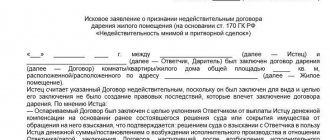A series of articles about methods and tools for protecting personal assets
In several earlier articles we have already talked about different ways to protect assets. If you haven’t read it, refresh your memory of these materials from Igumnov Group:
- Protecting Personal Assets: Prenuptial Agreement
- Personal Asset Protection: Production Cooperative
- Protecting Personal Assets: Alimony Agreement
- Personal Asset Protection: Property Separation Agreement
But let's return to the gift agreement. This is a kind of atavism when protecting assets, because 10 years ago you could “hide” an apartment by simply giving it to your mother in time. Today you will get tired of fighting off your creditors, proving that this is really a gift and not an attempt to withdraw assets.
But a gift agreement can still be useful, the main thing is to know how to use this tool. How and when to use it, and in what cases not to waste time on it, read below.
If you have a question about bankruptcy, subsidiarity or protection of personal assets, subscribe to the newsletter on our website.
Mating games are dangerous and unpredictable
Once upon a time there lived a married couple. A couple of years after the wedding, they began to actively quarrel. And the husband decided in advance to hide his assets, transferring his entire fleet of vehicles, several plots of land, garden houses and other real estate to daddy. All this property, which is important, was acquired by the man before marriage, and therefore he was not obliged to obtain the consent of his wife for these actions.
This is where the huge “But!” lies hidden.
The future ex-wife was not at a loss, filed for divorce, alimony and began dividing property. As a result of the proceedings, she was awarded almost 4.5 million rubles, as well as alimony not only for the child, but also for herself. Read more about child support agreements here. But the ex-husband did not pay - the debt accumulated, and a few years later the ex-wife filed for bankruptcy of the ex-husband.
And here the most interesting thing began: the financial manager chosen by the plaintiff discovered all the transactions of her ex-husband with the transfer of assets to his father. And although dad managed to hide some of the cars, scattering them among relatives, these so generous “gifts” were contested. The court considered this an abuse of law with the aim of causing losses to creditors (they wrote more about this here).
As a result:
- All real estate re-registered to the father was returned to the ex-husband’s bankruptcy estate by court decision.
- The cars were resold twice, so they sunk into oblivion, but an amount of 14.5 million rubles was recovered from the father. The court estimated the market value of the resold and donated cars to be exactly that amount.
And now the ex-wife can trigger the bankruptcy of her ex-husband’s father, which will allow her to dig deeper into his dirty laundry and find more valuable assets and transactions with them. And then switch to other relatives associated with these transactions. So he hid his property, hid it, right?
Procedure for re-registration to another person
Another option for the development of events is the need to rewrite the deed of gift to another person before the death of the donor. Since the agreement acquires legal force only with notarization, it can only be redone with the participation of a notary.
Re-issuance of a deed of gift and cancellation is permitted by law under similar conditions. An exception would be a deterioration in the financial condition of the donor.
Rewriting a contract to another person is permitted in two situations:
- The donee died before the agreement was recognized as completed by government agencies, and the text does not contain a condition that in this case the successors of the donee have the right to receive the gift as an inheritance.
- If the deed of gift was drawn up under the threat of the life of the previous owner, he is authorized to terminate the agreement and rewrite it to another person.
The rule here is the same for a will and a donation: legal force is assigned to the last copy. A deed of gift is the easiest way to transfer the rights to an apartment from the previous owner to the current one, but due to the complexity of the cancellation procedure, such agreements should be drawn up with extreme care.
Children's games with unchildish consequences
At the end of 2021, the woman formalized the donation of non-residential premises with an area of 151 square meters. m for his minor daughter. Her ownership was registered according to all the rules in Rosreestr after 1 month.
And in the fall of 2021, she was declared bankrupt, and the real estate she donated floated away, returning to the bankruptcy estate, because:
- The donation transaction fell under the concept of gratuitous alienation of property. And such transactions made before bankruptcy within a period of up to 3 years, and even in favor of the interested party, are voidable.
- The situation was aggravated by the fact that by the time the gift agreement was concluded, the woman already had tax debts. And, therefore, there were signs of her insolvency.
To receive judicial acts on the analyzed practice, leave your email below:
Where to apply, documents
Challenging a gift agreement is within the competence of district courts, where the plaintiff must provide the following documents:
- passport;
- statement of claim;
- certificates confirming the illegality of transferring the apartment as a gift to another citizen;
- receipt of payment of state duty;
- certificate of ownership;
- gift agreement.
Materials are provided in original form. After registration, copies are made of them, and the originals are given to the applicant.
What information should the claim contain:
- Name of the court.
- FULL NAME. and the registration addresses of the plaintiff and defendant.
- On what basis should an agreement be declared void (references to the Civil Code of the Russian Federation).
- Description of the circumstances and list of documents confirming the illegality of the transaction.
- Request to invalidate the transaction and restore the plaintiff’s property rights (as an example).
- Date of application and signature of the applicant.
Expert commentary
Kireev Maxim
Lawyer
It may take up to 10 business days for the petition to be reviewed, after which the petitioner is notified of the decision and legal proceedings begin. In total, the entire process may take several months.
Legal stories - playing with fire
This matter is already from the practice of our company. In it, Igumnov Group experts challenged the donation transaction on behalf of the plaintiff.
Conclusions: when starting bankruptcy proceedings for an individual, remember: if less than 3 years have passed since the donation of your property, there is almost a 100% chance that this transaction will be challenged and the property will be under attack. Because such disposal of the asset occurs free of charge and for the purposes of the affiliate. And anything that potentially harms creditors can be challenged.
How much will it cost: some numbers
A gift agreement is a gratuitous transfer of property or funds to another person. It can be concluded either orally or in writing. Depending on who is giving what, it either needs to be notarized or not.
For example, when donating real estate and a share in it, there must be a written, formalized agreement. If the donor is a minor or incapacitated, then he must be certified by a notary.
Igumnov Group experts recommend concluding all contracts in writing in order to sleep peacefully.
The cost of drawing up a contract may vary and will depend on the task. Notary services, as a rule, amount to 0.5% of the contract amount (no more than 20 thousand rubles and no less than 300 rubles). In the case of real estate, the cost will be calculated based on its cadastral price. The state duty in this case will be 2000 rubles.
Notary services for drawing up an agreement will amount to another 2-12 thousand rubles. (depending on the location and venerability of the notary). So you can download the standard document for free on the Internet.
The cost of fully protecting your assets also varies and depends on a number of factors: the size of the property, the risks associated with challenging transactions made with it, connections of creditors and much more.
We also recommend studying the most common mistakes so that you can avoid them when trying to protect personal property during bankruptcy. Better yet, contact us at Igumnov Group for advice.
Revocation of deed of gift
What is needed to revoke a gift deed?
Revocation is the cancellation of a gift transaction at the request of the donor. The donor may revoke the gift agreement for the following reasons:
- The health status, property or marital status of the donor has changed after the conclusion of the contract. And further execution of the contract may lead to a deterioration in the quality of life of the donor
- The recipient attempted to inflict serious bodily harm on the donor or his relatives.
- The fact of an attempted murder on the part of the recipient to the donor or one of his family members was recorded. If the donor or one of his family members dies, then his heirs have the right to demand the cancellation of the deed of gift.
- The donor wants to return his property after the death of the donee (only possible if this possibility was specified in the contract).
- Due to the fault of the recipient, significant material damage was caused to the property.
If less than 3 years have passed from the moment of donation to bankruptcy
For the most “resourceful”, a note: do not joke, putting ancient dates in the gift agreement in order to pass it off as a document ten years ago - the transaction is considered completed only from the date of registration by Rosreestr. This stage cannot be processed retrospectively. This means that the statute of limitations cannot be influenced in this way - even if you date it back to the 18th century.
In a situation where less than 3 full years have passed since the transaction before the acceptance of the application for personal bankruptcy of the donor, it will be challenged on the simplest bankruptcy grounds - the Federal Law “On Insolvency (Bankruptcy)” (Articles 61.2 and 61.3).
Here it is enough to prove that:
- the transaction was concluded with the intention of causing a loss to creditors;
- the loss has been caused (the law sees such damage in the gratuitousness of the transaction);
- the donee was obviously informed about the donor’s intention to cause damage to his creditors (if the donee is an interested party, then by law it is considered that he knew a priori and it is extremely difficult to prove otherwise).
Relatives and close acquaintances fall under these conditions. Such transactions are disputed once or twice.
If more than 3 but less than 10 years have passed from the moment of donation to your bankruptcy
At first glance, here bribes from a bankrupt are smooth, because the statute of limitations under bankruptcy standards has expired. Here Art. plays the role of the Joker against the bankrupt. 10 of the Civil Code on abuse of right. Moreover, it also works in relation to transactions completed before the adoption of the law on bankruptcy of individuals (07/01/2015).
The essence is the same - you need to prove that the person gave the airplanes-steamers in order not to pay his debts. We have already written in more detail about such fictitious transactions here and here. But how can we determine this?
Usually, a gift transaction is considered fictitious if it occurs if enforcement proceedings are initiated or a lawsuit is filed to collect the amount of debt from the donor. In simple words, when it is not news to a person that creditors have claims against him.
But there is another option - when the donation occurs BEFORE creditors and obligations to them appear on the horizon. We at Igumnov Group have encountered situations many times when the court dug so deeply that at the hearings questions were seriously considered in the style of whether the capabilities of the accused KNOWLEDGELY allowed for a negative development of the situation (read “the appearance of debts and the subsequent emergence of claims from creditors in the next 10 years").
A case from one's life
For example, a businessman who has no debts transfers his Ferrari to his son. But after six months he stops paying the loan he took out to develop his business. Next, the bank bankrupts his company, engages the person as a subsidiary and bankrupts him as a private individual. By that time, Ferrari had been registered with the businessman’s son for 5 years.
And the court faces a dilemma: did the person abuse his right by making this expensive gift to his son, or did he not abuse it. And the businessman’s guilt is proven. "How?" - you ask?
A person has been in business for more than 15 years, has excellent education, expertise, experience, and open access to the company’s assets and money. A priori, he should and could have foreseen the problems of the business and the corresponding risks. And Ferrari easily falls into the bankruptcy estate and is sold under the hammer.
Moral: the legislation cannot yet offer clear parameters by which it can be accurately determined that here a person has exceeded his authority, but here he is definitely clear before the law. Therefore, this norm is interpreted by the courts at their own discretion, and cases from real practice show that one court will consider the same circumstances to be 100% abuse, while another will consider it normal behavior. Statistics now according to Art. 10 of the Civil Code of the Russian Federation is still half-hearted, so whether your gift transaction, completed in the period 3-10 years before your bankruptcy, will be challenged or not will largely be decided by the case and the professionalism of your lawyers, who can influence the convictions of a particular judge.
When they give someone else's one-room apartment
A woman, being married, purchased an apartment of 37 square meters in 2015. m and registered it in her name, giving it to her son a year later. A month after donating the property, the woman got divorced, and 2 years later her ex-husband was declared bankrupt. The bankruptcy attorney tried to challenge this deal, deciding that half of it belonged to the ex-husband, because is considered jointly acquired property:
- a transaction within 3 years before personal bankruptcy falls under suspicion;
- During the period of the transaction, an application was filed against the donor’s ex-husband to hold him vicariously liable for 27 million rubles.
It would seem that the apartment was crying? But no, the couple thought through everything and prepared properly. They managed to prove that the son originally owned the apartment, so creditors cannot claim repayment of debts from its sales.
How they did it:
- In 2013, my now adult son bought a house with his own money, which he sold 2 years later (he got married and wanted to buy an apartment).
- To avoid division in the event of a divorce, the son registers this apartment in his mother’s name, and the funds for its purchase are used from the sale of that house.
- His mother buys an apartment and gives it to her son.
All these movements of funds are confirmed to the court by a notarized statement, dated, however, 2021, which does not bother the court. And since the donor’s ex-husband has nothing to do with housing transactions, then creditors have nothing to expect from her.
We cannot say with certainty whether this is a coincidence or a scheme thought out in advance. But one can only applaud the execution.
To receive judicial acts on the analyzed practice, leave your email below:
Challenging a donation after the death of the donor
Situations arise when heirs find out that the testator, during his lifetime, donated his property to one of his relatives or to a complete stranger. In this case, the heirs are deprived of the right to such property. But sometimes it is possible to challenge donations on the grounds provided by law. However, there are certain features for challenging a donation:
- The statute of limitations in this case is 3 years ;
- the plaintiff did not know or should not have known about the transaction during the period when the donor was alive.
Otherwise, it is almost impossible to challenge such a transaction. In court, it will be necessary to prove not only the grounds, but also the ignorance of the plaintiff during the period of the donor’s life.









